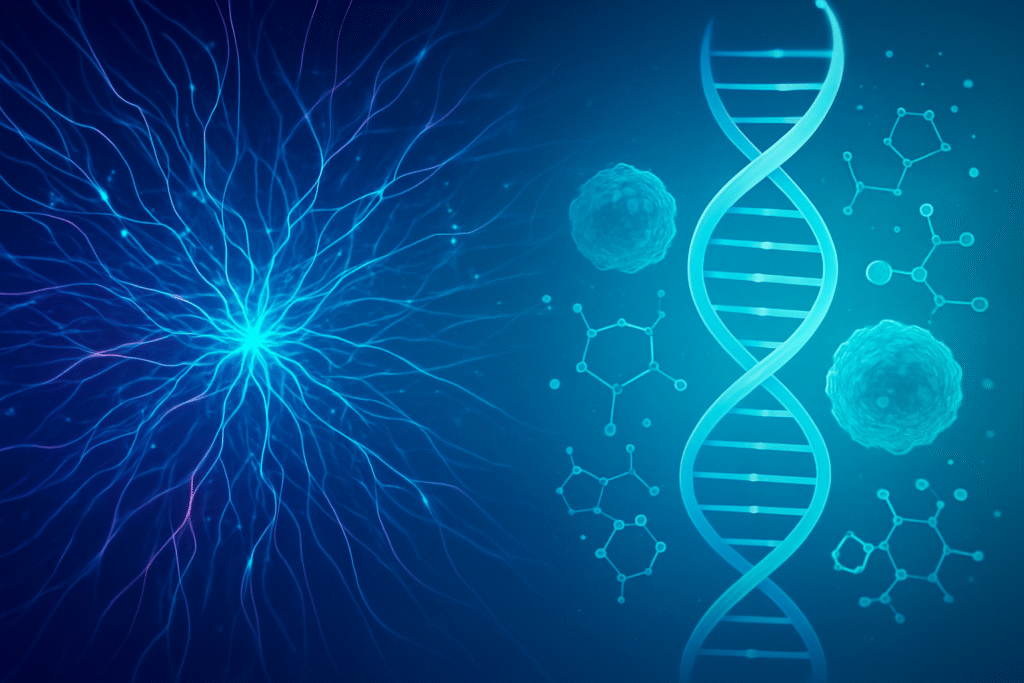
In a monumental leap for global public health, the Indian Institute of Technology (IIT) Bhubaneswar, in collaboration with the Institute of Life Sciences (ILS) Bhubaneswar, has spearheaded the development of India's first indigenous, next-generation subunit vaccine against tuberculosis (TB). This groundbreaking initiative, culminating in the 'Hsp16.3C4' vaccine, has successfully completed pre-clinical trials, showcasing robust immune responses without adverse effects. This advancement marks a critical turning point in the relentless global battle against TB, a disease that continues to claim millions of lives annually, and highlights the transformative power of integrating advanced biotechnology with cutting-edge artificial intelligence.
The immediate significance of this breakthrough cannot be overstated. With the existing Bacillus Calmette Guérin (BCG) vaccine offering limited protection, particularly against pulmonary TB in adults and adolescents, the Hsp16.3C4 vaccine emerges as a beacon of hope. Its unique design, which does not interfere with the BCG vaccine's biology, positions it as a potential standalone immunization or a crucial booster, promising enhanced and broader protection. The recent technology transfer to TechInvention Lifecare Limited through a quadripartite license agreement underscores the commitment to bringing this vital innovation from the lab to the global population, bolstering India's self-reliance in public health and contributing significantly to the worldwide effort to eradicate TB by 2030.
A New Paradigm in Immunization: The Technical Edge of Hsp16.3C4
The Hsp16.3C4 vaccine represents a significant technical departure from traditional TB immunization strategies. At its core, Hsp16.3C4 is a C-terminal truncated variant of the Mycobacterium tuberculosis small heat shock protein Hsp16.3. This protein is an immunodominant antigen and a molecular chaperone, vital for the survival of M. tuberculosis during latent infection by preventing protein aggregation under stress. By targeting this specific, latency-associated antigen, the vaccine aims to tackle both active disease and the critical issue of latent TB reactivation, a major contributor to the global TB burden.
Pre-clinical trials conducted on mice models have showcased the vaccine's remarkable capabilities. Hsp16.3C4 induces potent cellular and humoral immunity, specifically enhancing Th1 responses through increased production of IFN-γ and IL-2, and eliciting robust activated memory T and memory B cell responses, alongside elevated levels of IL-17A. Crucially, it demonstrated a significant reduction in pulmonary bacterial burden and pathology in infected mice. A groundbreaking finding is its synergistic effect when co-administered with the Bacillus Calmette-Guérin (BCG) vaccine, leading to enhanced protection against both acute and chronic M. tuberculosis infection, a performance superior to BCG alone. This unique compatibility stems from Hsp16.3C4 being an M. tuberculosis-specific antigen that does not interfere with BCG's biology, ensuring its effectiveness as a booster. Furthermore, the preclinical trials affirmed its safety, with no observed toxicity signals.
The development of Hsp16.3C4 is deeply rooted in advanced biotechnology. As a protein subunit vaccine, it contains only purified antigenic parts of the pathogen, offering a safer and more stable alternative to live attenuated vaccines like BCG, which carries risks for immunocompromised individuals. Key biotechnological processes included precise antigen selection and engineering, heavily supported by bioinformatics and structural biology techniques. While explicit details on AI's direct involvement in this specific vaccine's initial design are not fully public, the broader research context at IIT Bhubaneswar, including its interdisciplinary AI & HPC Research Center (AHRC) with a focus on "AI in Medicine," strongly suggests the implicit or explicit use of AI-driven immunoinformatic strategies. AI algorithms are increasingly deployed in epitope prediction, computational biology, and molecular dynamics simulations to accelerate the discovery and optimization of vaccine candidates, significantly narrowing down potential designs from millions to a select few.
This innovative approach significantly differs from the existing BCG vaccine, which, despite being the only licensed TB vaccine for over 80 years, offers inconsistent and limited protection against adult pulmonary TB and insufficient efficacy against latent TB reactivation. By targeting a latency-associated antigen and employing a safer subunit design with synergistic boosting capabilities, Hsp16.3C4 addresses critical gaps that BCG cannot. Initial reactions from the industry, exemplified by the technology transfer to TechInvention Lifecare Limited, indicate strong confidence in its preclinical success and potential for commercialization. While direct comments from the AI research community specifically on Hsp16.3C4's AI utilization are limited, the general consensus acknowledges AI's increasingly vital role in accelerating complex drug and vaccine discovery processes.
Reshaping the Biotech Landscape: AI's Catalytic Effect on Industry Players
The successful preclinical development of the Hsp16.3C4 vaccine, underpinned by advanced biotechnology and the inferred integration of AI, is poised to significantly reshape the competitive landscape for AI companies, tech giants, and biotech startups. This paradigm shift underscores the burgeoning role of computational power in accelerating drug and vaccine discovery, creating new opportunities and challenging established norms.
AI companies specializing in bioinformatics, machine learning, and data analytics stand to gain immensely. The intricate processes of rapid antigen identification, optimal vaccine design, prediction of immune responses, and streamlining of clinical trials are increasingly reliant on sophisticated AI platforms. Companies offering generative AI for protein sequences, computational modeling for immune system simulations, and advanced tools for analyzing complex biological data will see a surge in demand. Furthermore, the need for specialized AI solutions to predict toxicity, immunogenicity, and potential adverse effects in early development stages, as well as to optimize clinical trial design and patient selection, will drive innovation and investment in these niche AI firms. Collaborations between AI startups, such as Iktos in drug discovery, and established pharmaceutical players are expected to intensify, creating a vibrant ecosystem of innovation.
Tech giants with formidable cloud computing, AI, and machine learning capabilities, including Amazon Web Services (NASDAQ: AMZN), Google (NASDAQ: GOOGL), and Microsoft Azure (NASDAQ: MSFT), are already deeply embedded in the life sciences sector and will further solidify their strategic positions. These companies provide the essential foundational infrastructure—scalable cloud services and high-performance computing—required for the intensive data processing and computational demands of AI-driven research and development. Their AI research arms are poised to develop increasingly sophisticated algorithms for target identification and drug design. Strategic alliances, mirroring those seen during the COVID-19 pandemic, where tech giants offered AI expertise and computational power to accelerate vaccine development, will become even more prevalent, transforming them into indispensable partners for pharmaceutical and biotech companies.
For biotech companies and startups, the impact is transformative. TechInvention Lifecare Limited, having acquired the technology for the Hsp16.3C4 vaccine, is a direct beneficiary, positioned to potentially commercialize India's novel TB vaccine and address a critical global health need. More broadly, "AI-native" biotechs—companies built with AI as their core value proposition—will gain a significant competitive edge. These firms leverage AI for faster hypothesis generation, automated experiments, and predictive modeling, drastically reducing R&D costs and time to market for life-saving therapies. AI enables the development of precision vaccines by analyzing genomic and multi-omics data, tailoring treatments to individual patient needs, leading to more effective and safer outcomes. Furthermore, AI's role in optimizing biomanufacturing processes, quality control, and lab automation promises to speed up production and distribution, crucial for global health initiatives. This shift disrupts traditional R&D, favoring companies that integrate AI for enhanced efficiency and creates new market entrants while potentially leading to consolidation as larger players acquire AI-centric startups to maintain competitiveness.
A Glimpse into the Future: AI, Biotech, and Global Health
The indigenous TB vaccine research at IIT Bhubaneswar, amplified by the integration of AI and biotechnology, resonates profoundly within the broader AI landscape and healthcare trends. This initiative is a powerful exemplar of how AI is revolutionizing healthcare, streamlining complex medical processes, improving efficiency, and enhancing accessibility on a global scale. It aligns perfectly with key trends such as the acceleration of drug and vaccine discovery, where tools like AlphaFold for protein structure prediction are identifying hidden patterns in pathogen biology and drastically reducing development timelines. Furthermore, AI's role in enhanced diagnostics, personalized medicine, operational efficiency, and remote monitoring underscores its comprehensive impact across the healthcare spectrum, making care more precise and accessible.
The impacts of such AI and biotechnology-driven advancements are overwhelmingly positive. They promise faster solutions to persistent and emerging health crises, as AI significantly accelerates the research and development phases for drugs and vaccines. By enabling a deeper understanding of pathogens and host responses, AI can lead to more effective and targeted interventions, as evidenced by Hsp16.3C4's potential to enhance the efficacy of the existing BCG vaccine. Additionally, AI-powered diagnostics and decentralized clinical trials can contribute to greater accessibility and cost-effectiveness in healthcare, while also playing a crucial role in the development of new drugs and vaccines to combat the growing threat of antimicrobial resistance.
However, this rapid integration of AI also brings forth critical concerns. The use of vast, sensitive patient datasets by AI systems raises significant questions regarding data privacy and cybersecurity risks. There's also the persistent challenge of bias and fairness; if AI systems are trained on unrepresentative or biased data, they can perpetuate inequalities, leading to misdiagnosis or underdiagnosis for certain demographic groups. Accountability and transparency remain key issues, as the "black box" nature of some AI algorithms can make it difficult to understand their decision-making processes, eroding trust among patients and practitioners. Furthermore, there's a risk of healthcare professionals becoming overly reliant on AI-generated recommendations, potentially diminishing critical thinking and clinical judgment, and raising ethical dilemmas where AI decisions might conflict with patient preferences or reduce human empathy in care.
Comparing this breakthrough to previous AI milestones in medicine reveals a trajectory of continuous evolution. From early rule-based expert systems like MYCIN in the 1970s to the integration of machine learning in the 1980s (e.g., DXplain), AI's capabilities steadily expanded. The 1990s and 2000s saw AI merging with medical imaging and Electronic Health Records (EHRs) for better clinical decision-making. The current deep learning era, starting in the 2010s, has been a game-changer, with AI achieving diagnostic accuracy comparable to human experts in areas like diabetic retinopathy (Google (NASDAQ: GOOGL) in 2017) and receiving FDA approvals for cancer diagnosis and MRI interpretation. AI's contribution to SARS-CoV-2 vaccine development and its role in accelerating TB research through tools like "MycoBCP" mark significant advancements. The IIT Bhubaneswar research, by leveraging advanced biotechnological methods and aligning with these accelerating trends, stands as a testament to AI's growing power in delivering targeted, efficient, and globally impactful solutions to humanity's most enduring infectious diseases.
The Horizon of Hope: Future Trajectories for AI and Biotech in TB Vaccine Research
The groundbreaking work at IIT Bhubaneswar with the Hsp16.3C4 vaccine lays a robust foundation for the future of TB vaccine research, propelled by the relentless advancements in AI and biotechnology. In the near term, we can anticipate these technologies to dramatically streamline and enhance every stage of vaccine development. AI-driven tools will continue to revolutionize antigen discovery and design, analyzing vast genomic and proteomic datasets of Mycobacterium tuberculosis to pinpoint highly immunogenic epitopes and predict stable, less mutable microbial components. The precision afforded by AI, exemplified by tools like AlphaFold in predicting protein structures, will be crucial in refining subunit vaccines like Hsp16.3C4 and optimizing adjuvant selection to maximize immune responses and synergistic effects with existing vaccines. Furthermore, machine learning models are poised to increasingly facilitate computational pre-clinical evaluation, potentially reducing the reliance on extensive in vitro and early-stage animal experiments, while mRNA vaccine platforms, building on their COVID-19 success, are being rapidly adapted for TB, offering unprecedented flexibility and scalability for multi-antigen approaches.
Looking further ahead, the long-term convergence of AI and biotechnology promises even more transformative changes. Experts predict a shift towards personalized TB vaccines, where AI-driven genomics will analyze individual genetic profiles to tailor treatments for maximal efficacy. The vision of replacing traditional animal pre-clinical testing with sophisticated computational models is gaining traction, with regulatory bodies like the US FDA exploring such avenues, which would drastically shorten development timelines and costs. AI will also enable real-time in vivo modeling for immunobridging and predicting protection in clinical trials, leading to faster and more efficient evaluation of vaccine candidates. The broader ambition of a "100 Days Mission" for pandemic response, driven by advanced AI tools and global collaboration, while aimed at emergent threats, will undoubtedly establish protocols and technologies that profoundly benefit endemic diseases like TB, leading to advanced Multi-Epitope Vaccines (MEVs) designed and optimized through extensive bioinformatics and AI modeling.
The synergy between AI and biotech will unlock a multitude of critical applications. On the horizon are enhanced understandings of M. tuberculosis infection cycles at genetic, molecular, and cellular levels, providing deeper insights for novel drug targets and vaccine candidates. AI platforms like TBMeld® are being developed to specifically address the growing threat of multidrug-resistant (MDR) and extensively drug-resistant (XDR) TB strains. We can also expect advancements in Host-Directed Therapies (HDT) that modulate the human immune response to weaken TB persistence. Improved diagnostics and screening, through AI-assisted analysis of medical imaging (e.g., chest X-rays) and differentiation between active and latent TB, will optimize treatment allocation. Finally, AI will play a pivotal role in optimizing vaccine manufacturing workflows and supply-chain operations, including cold-chain logistics, ensuring efficient global deployment.
Despite this immense promise, significant challenges must be diligently addressed. Ensuring the quality, diversity, and availability of large datasets for AI models is paramount to prevent biases and ensure equitable vaccine efficacy across populations. Robust ethical, logistical, and regulatory frameworks are urgently needed to govern data privacy, algorithmic bias, transparency, and explainability of AI-driven vaccine development. Bridging the translational gap between computational insights and clinically actionable immunological strategies remains a hurdle, requiring rigorous validation through "wet" laboratory experimentation and human trials. Concerns about the potential misuse of powerful biotechnological tools and the need for robust biosecurity measures also persist. Furthermore, ensuring equitable access to AI-driven tools, infrastructure, and skilled personnel in low- and middle-income countries is crucial to prevent exacerbating global health inequities, alongside the need for substantial funding for early-stage biotech companies.
Experts remain largely optimistic, predicting that AI-assisted research and innovation will profoundly improve global human health and increase life expectancy. They foresee a new era of personalized medicine and emphasize that global collaboration, streamlined regulatory processes, and strong public investment, akin to the rapid response seen during the COVID-19 pandemic, must be applied to TB vaccine development. India, with its significant scientific leadership and manufacturing capacity, is uniquely positioned to play a pivotal role in spearheading the development and equitable deployment of these next-generation TB vaccines. Many experts believe that an effective TB vaccine is within reach, with current research, particularly that exemplified by IIT Bhubaneswar, contributing significantly to achieving the World Health Organization's (WHO) 2035 TB eradication target.
A New Chapter in Global Health: The AI-Biotech Synergy Against TB
The indigenous TB vaccine research at IIT Bhubaneswar, culminating in the promising Hsp16.3C4 vaccine, marks a pivotal moment in the global fight against tuberculosis. This detailed exploration reveals not just a scientific breakthrough but a testament to the transformative power of integrating advanced biotechnology with artificial intelligence. The Hsp16.3C4, India's first homegrown next-generation subunit vaccine, has demonstrated remarkable efficacy and safety in preclinical trials, offering a potent alternative or booster to the century-old BCG vaccine. Its unique design, which synergistically enhances immune responses without interference, addresses a critical unmet need in protecting adolescents and adults from pulmonary TB. The swift technology transfer to TechInvention Lifecare Limited underscores the industry's confidence and the immediate potential for commercialization.
This development signifies a profound shift in the landscape of medical research, where AI is no longer a peripheral tool but a central catalyst. The inferred and explicit applications of AI in accelerating antigen discovery, optimizing vaccine design, predicting immune responses, and streamlining clinical trials are reshaping the competitive dynamics for AI companies, tech giants, and biotech startups. Companies offering AI platforms for bioinformatics and data analytics are seeing increased demand, while tech giants provide the essential cloud infrastructure and AI services. "AI-native" biotechs are gaining a competitive edge, driving faster R&D, personalized medicine, and enhanced manufacturing. This AI-biotech synergy is poised to disrupt traditional pharmaceutical R&D, emphasizing efficiency, data-driven insights, and faster time-to-market.
The wider significance of IIT Bhubaneswar's initiative extends beyond TB, aligning with global trends of AI revolutionizing healthcare—from accelerated drug discovery and enhanced diagnostics to personalized medicine and operational efficiency. While promising faster, more effective, and potentially more accessible solutions, this rapid integration necessitates careful consideration of challenges such as data privacy, algorithmic bias, accountability, and the need for robust ethical and regulatory frameworks. Nonetheless, this breakthrough stands as a continuation of AI's long journey in medicine, from early expert systems to today's deep learning marvels, demonstrating its capacity to tackle humanity's most enduring infectious diseases.
As we look to the future, the horizon is filled with both immense promise and critical challenges. Near-term developments include AI-driven antigen design and optimized delivery systems, while long-term visions encompass personalized TB vaccines and the potential replacement of animal testing with sophisticated computational models. The synergy between AI and biotech promises enhanced understanding of pathogen biology, solutions for drug-resistant TB, and optimized vaccine manufacturing. However, addressing issues of data quality, ethical governance, the translational gap from lab to clinic, and ensuring equitable global access will be paramount. Experts remain optimistic, predicting a new era of personalized medicine and emphasizing global collaboration as key to achieving the WHO's 2035 TB eradication target. The IIT Bhubaneswar Hsp16.3C4 vaccine is not merely a scientific achievement; it is a beacon, illuminating the path forward where AI and biotechnology converge to write a new chapter in global health, bringing us closer to a world free from the scourge of tuberculosis.
This content is intended for informational purposes only and represents analysis of current AI developments.
TokenRing AI delivers enterprise-grade solutions for multi-agent AI workflow orchestration, AI-powered development tools, and seamless remote collaboration platforms.
For more information, visit https://www.tokenring.ai/.





